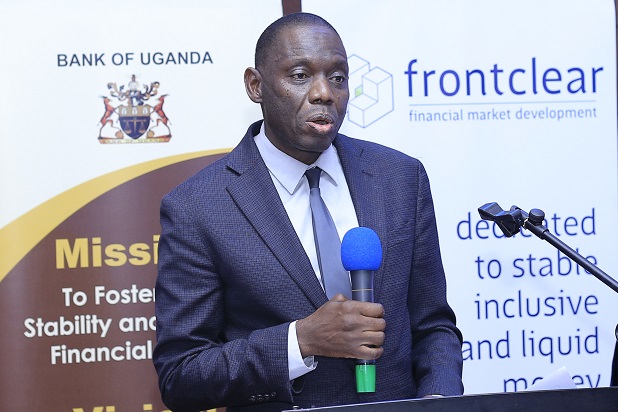BoU Deputy Governor, Michael Atingi-Ego
Commercial banks have started raising interest rates in response to the recent increase in the Central Bank Rate, the Bank of Uganda’s rate that is used to influence the cost of money on the market.
Earlier this month, the industry regulator raised the rate from 8.5 to 9 percent and has now increased it by 250 basis points (from 6.5 percent) since the year began as it tries to contain inflation.
The Bank uses adjustment of the CBR under its Monetary Policy to control inflation by regulating the amount of money in circulation. The idea behind it is that when there is little money, there will be less demand for goods and services and this will lead to a fall in price or a slowdown in the rate at which prices rise, hence lower inflation.
Ironically, there are several reports that indicate a decline in people’s personal incomes, household incomes as well as business returns in the private sector. This has also been reflected in the slowdown in economic activity. According to the Bank of Uganda, the economy contracted in the quarter ended March 2022, for the second successive quarter due to high inflation and high foreign exchange rates, among other factors.
“Quarterly estimates by the Uganda Bureau of Statistics indicate that the economy contracted by 1.6 percent quarter-on-quarter in March 2022. All sectors of the economy contracted with the services sector taking the biggest hit,” said the BOU Monetary Policy Statement for August 2022. Other indicators like the Composite Index of Economic Activity also show how private sector activities are suppressed by cause of low consumer demand and high inflation.
“Overall, economic growth prospects have been dimmed further with increasing risks of global recession and weaker consumer and business sentiments as high inflation and commodity prices continue to erode household and business incomes, and financial conditions tighten.” This admission of weak consumer demand or decline in spending power has not stopped the BOU from squeezing the financial conditions further.
Indeed, commercial banks have responded by increasing the interest rates, notifying their customers of the changes that are expected to take effect starting September.
These have increased the average lending rate to about 20.5 percent from 19 percent three months back, and is expected to continue as long as the CBR continues to rise.
The concern, however, is how far the CBR can be raised and how far the commercial banks can go in raising interest rates before the market reaches “a tipping point”. In November 2011, BOU increased the CBR from 20% to 23 % in two months after the inflation rate doubled from 15.7 in June to 30.5 percent in October that year.
Then BOU Governor, the late Emmanuel Tumusiime Mutebile said he would raise the CBR even to 50 percent if inflation continued rising. The sharp rise in consumer prices then was attributed to poor harvest due to a long drought as well as rising international fuel prices.
Today, global fuel prices have been blamed for the current situation, driven by high crude oil prices and disruption of transportation by sea and air over the European space due to the ongoing was between Russia and Ukraine.
Others affected by the disruptions in the supply chain include wheat as well as vegetable oil due to increased demand for crude palm oil, the major alternative to seed oil from Russia and Ukraine. University lecturer and economist Fred Muhumuza faults the BOU for using the CBR to control money flow to the public so as to discourage demand and hence curb inflation.
Muhumuza says Uganda is suffering largely imported inflation and not local inflation that arises from too much money in public hands. According to him, the BOU policy only serves to impoverish people further because already personal incomes have been affected with people being forced to change their spending habits.
More people have parked their private vehicles, while others are buying less of items like wheat products and vegetable oil. He says instead, the government should encourage and support domestic production to increase export and also consume more locally produced items to avoid importing inflation.
However, Deputy Governor Michael Atingi-Ego says if Ugandans reduce their demand for the highly priced international commodities, inflation at home can be tamed.
The banks which are raising their lending rates say he changes will affect both new and existing customers, meaning a person who borrowed money three months ago and is continuing to service it will have to pay the balance at a higher interest rate.
But the Banking industry led by BOU already report that there is a decline in the growth of private sector credit, with fewer people going for the loans, which is affecting growth of the economy. It is argued that many would be borrowers are staying away from loans because they are not sure of paying back in time due to the current economic environment.
But Dr Twinemanzi Tumubweine, the Executive Director Supervision at BOU does not rule out the reduced interest by the lenders to lend to the private sector because of the assumed risk of defaulting.
Other experts have also advised the government of Uganda to focus on increasing domestic production to reduce imports, instead of tightening liquidity which may affect the poor more. David Cowan, Citi Bank Africa Regional Economist says Uganda’s economy has suffered inflation more than her peers in Africa mainly because it left the oil prices to be determined by demand, supply and global factors, while other countries introduced subsidies as emergency measures.
“The oil prices in Uganda are too high compared to other countries in Africa, because Uganda declined to subsidise the cost of fuel or waive taxes. This leads to high costs of transport and high costs of food which drive into prices of other commodities,” he said.
Others have shown that Uganda has always had the most drastic measures when it comes to controlling inflation in Africa.
In July, BOU became the first country in Africa to convene a special meeting to set a new interest rate since the Russia-Ukraine war started, when the Deputy Governor called a Monetary Policy Meeting just one month after the previous one, instead of the usual two months. While Uganda has raised the CBR by 2.5 percentage points this year, Kenya and Rwanda, for example, have only adjusted theirs by 0.5 percent.
While appearing on the online channel run by the ICT and National Guidance Ministry, Geraldine Ssali the Permanent Secretary Minister for Trade, Industry and Cooperatives, said the current inflation trend will have to come down, though the country has learned her lesson. She says that in the meantime, Uganda must increase domestic production to reduce the shocks caused by over-reliance on imports.
-URN





